In Midlothian, Texas, about 25 miles south of Dallas, sits a 1,200-acre summer camp run by The Salvation Army. Lately, the lake where kids normally canoe is doubling for the Sea of Galilee. On its banks is a replica of the Biblical village of Capernaum. This is where Jonathan Roumie—when not interrupted by the occasional low-flying airplane—is portraying Jesus Christ in the fourth season of The Chosen.
The crowdfunded series that no one in traditional Hollywood saw coming has become so successful—the first three seasons garnered more than 110 million viewers worldwide—that The Chosen's worldwide distribution rights have now been sold to Lionsgate, better known for mainstream blockbusters such as The Hunger Games. Meanwhile, one of this summer's biggest box office hits—and surprises—has been the faith-based action movie Sound of Freedom starring outspoken Catholic Jim Caviezel, who played the title role in Mel Gibson's 2004 The Passion of the Christ, as a federal agent on a mission to rescue children from sex traffickers. And Jesus Revolution, a film released earlier this year about hippies turning to Christ in the 1970s, surpassed expectations to become Lionsgate's biggest release in over four years.
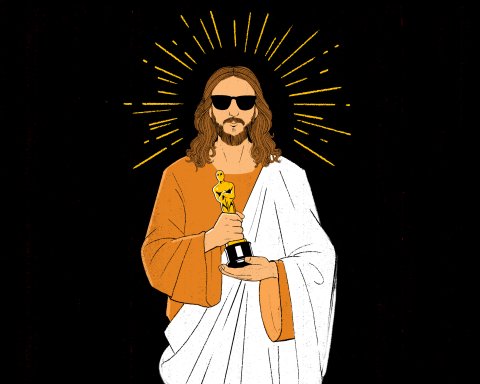
Need more proof that Jesus is suddenly a very hot commodity in the entertainment industry? Consider that MGM, 21st Century Fox and Sony Pictures have each launched their own faith-based studios. Meanwhile, renowned director Martin Scorsese is planning a new film about Jesus and so is art house director Terrence Malick. And Netflix has said it is working on bringing more faith-based content to its platform as well.
The surge of content and viewership has surprised many experts given the long-term decline in the number of U.S. adults who identify as Christian—from 78 percent in 2007 to just 63 percent in 2021, according to the Pew Research Center. Some of the faithful are hoping that the renewed interest in Jesus in the mass market could also prompt a revival in faith—one that they are now trying to drive with a $1 billion advertising campaign appearing during the Super Bowl, on television networks and on billboards across America in an attempt to reframe Christianity for a modern age and reverse its waning following.
"There's a tremendously powerful movement toward Jesus right now that most people aren't aware of," says Ted Baehr, the founder of Movieguide, which hosts an annual gala that rewards films based on their Biblical messaging. "The nature of man is to be hostile to Christianity and to salvation. But there's more and more people in Hollywood moving in the other direction."
Whether there is, in fact, an innate antagonism to Christianity in the entertainment industry—or elsewhere—is debatable. "There's no evidence at all of any bias against Christians in Hollywood," says Jason Bivins, a professor of philosophy and religion at North Carolina State University. "I do, however, think that a lot of people get 'likes' and so on by pretending to be oppressed."
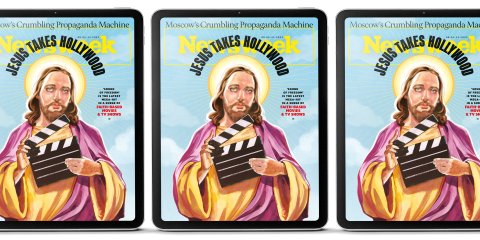
This much, at least, seems clear: There has been a dramatic increase lately in films that portray the faith and its followers sympathetically. According to Movieguide, the total percentage of movies with "positive Christian/redemptive content" has soared from 10 percent in 1991 to 59 percent in 2022, although that figure includes films with inspirational or family-friendly messaging deemed consistent with Christian values—offerings as diverse as Top Gun: Maverick and Sonic the Hedgehog 2 make the grade—along with overtly faith-based content.
Count 70-year-old pastor Greg Laurie of the Harvest Christian Fellowship, a group of Baptist evangelical churches based in Southern California, among those who are optimistic that the recent commercial success of faith-based content could herald a religious revival. Laurie's personal story as a teenager forms part of the original "Jesus Revolution" portrayed in the film, based on the book he authored of the same name.
"It's a phenomenon. Jesus Revolution 2.0 could be happening," he tells Newsweek. "This is a moment in time when pop culture really needs Jesus." Laurie adds, "When we took drugs as hippies it was to become aware, which didn't work. Today, they're taking drugs to escape."
But there are mixed signs on whether such expectations are realistic in a U.S. society that is increasingly polarized between conservative and liberal social views on everything from abortion to transgender rights. Fractures are visible even among Christian groups, with some identifying as traditionalists, some as Christian nationalists and others as progressives. And Christian groups are among the first to point out that while Hollywood may embrace the cash from renewed interest in the Jesus story, that doesn't mean it will stop making movies that paint Christianity in a worse light.
There are echoes now of the evangelical Jesus Movement of the 1970s, which started on the West Coast and melded 1960s counterculture with Christianity, but this time it feels more manufactured, says Bivins, the author of several books about Christianity, including last year's Embattled America: The Rise of Anti-Politics and America's Obsession with Religion. "There's an effort to reframe the messaging," he tells Newsweek. "If young people take it in a hippie-Jesus direction, then it could be a net positive. If we're just considering tolerant, loving, revolutionary Jesus, that's something younger Americans are looking for."
Putting Jesus front and center could have advantages for those looking to boost the image of the faithful. Barna, a polling service on spirituality and faith, says that while churchgoing has waned, 71 percent of Americans still have a positive view of Jesus even while just 57 percent view Christianity positively and only 44 percent saw Christian pastors or priests favorably.
"There's a deep hunger for spiritually significant stories rooted in eternal questions of life and death, and life after death," says Craig Detweiler, president of The Wedgwood Circle, a nonprofit that has raised $100 million for faith-based movies like I Can Only Imagine, Silence and The Last Days in the Desert, plus TV shows, books and music. "The pandemic reminded us of our mortality and Jesus isn't trademarked, so the material can be held up by all types of entertainers."
Unexpected Hits
The Chosen is Exhibit Number One. Instead of looking for traditional Hollywood backing to tell a 2,000-year-old story about a carpenter and his disciples, the folks behind the series posted their intentions online and raised $11 million to produce the first season, which streamed in 2019 and set a record for a crowdfunded entertainment project. Four years later, independent analysis indicates that more than 110 million people worldwide have watched more than 500 million episodes of The Chosen, which has made its way from Christian platforms to mainstream services such as Netflix, Amazon Prime and Peacock.
Brad Pelo, president of The Chosen, a company founded to house the namesake TV show and other assets, said that 16,500 people participated in the equity crowdfunding and they now collectively own 46 percent of the company. The average investment was $100, and the profit on that to date is $20, with more expected, given the series so far has generated $200 million in revenue through streaming and broadcasting the show and via merchandise, including bestselling DVDs and T-shirts emblazoned with "Get Used to Different," a line spoken by Jesus in the show.
Roumie, who plays Jesus, is himself among the faithful. He tells Newsweek that, before the series, he had been struggling to make a consistent living as an actor. Then, he says, "One day, I surrendered everything to God." Three months later, Dallas Jenkins, the show's creator, director and writer, offered Roumie the role. Now, he can't walk the streets without being recognized. Some cry when they see him, some ask him to lay their hands on them.
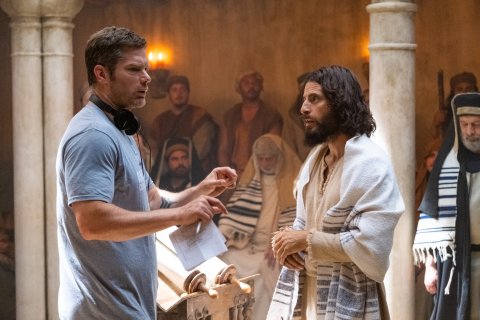
"The connections to the characters are strong, emotional and visceral. On some level, they think I have extra pull with God. I don't, but I'm always happy to pray with them," he tells Newsweek. "When you strip God out of the culture, there's always a movement to bring him back. In the past 30 years, God's been pushed from schools, government, public forums. The Chosen and Jesus Revolution is a response."
He says he's often trolled online, mostly by believers who object when The Chosen strays too far from the Bible, but also by critics of Christianity. He says, "I've seen a big push against religion, and Christianity in particular."
Jenkins, whose father Jerry wrote the bestselling Left Behind series of Christian novels, first cast Roumie as Jesus for a few short films that played at his church a decade ago, and the actor got the nod again when he created The Chosen.
"The times we're living in are similar to 2,000 years ago," Jenkins tells Newsweek. "There was oppression, followers of Jesus were divided, there were groups fighting for control and people were struggling spiritually and emotionally. Jesus said he wasn't there to start a war or win a battle but to change hearts."
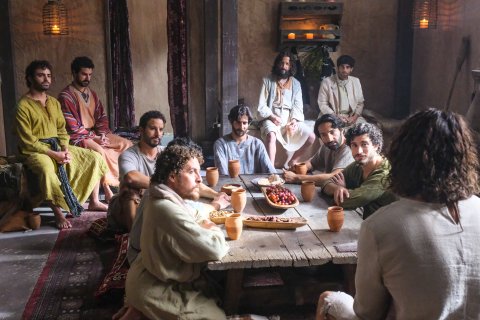
Yasmine Al-Bustami, who plays Ramah, a non-Biblical character in The Chosen, adds: "The assumption in Hollywood is a show about Christ isn't as woke as it should be. I love the pushback. It lights a fire under my a**."
Season four of The Chosen was two weeks away from wrapping when actors went on strike in mid-July but got a variance that enabled production to continue after a short delay. It is now scheduled to debut in January. "Jesus and his disciples have become a threat to the social order. It will be a bigger show with more scale," says head of production Mark Sourian. In the sixth season, Jesus is crucified and in season seven he will be resurrected, then the series will wrap—but new universes are already planned along the lines of the Star Wars franchise.
As for Jesus Revolution, it was made by Kingdom Story Company, a studio that makes faith films usually released through Lionsgate. When Lionsgate
reported an 85 percent year-over-year revenue increase in its motion picture segment this May, it credited the performance of three films, one of which was Jesus Revolution (the others were John Wick: Chapter 4 and Plane). Joe Drake, Lionsgate's chairman of the motion picture group, told Wall Street to expect two faith-based films a year going forward.
"Faith-based programming is currently enjoying good reception," says Barrington stock analyst James Goss, who covers Lionsgate.
Jesus Revolution stars Kelsey Grammer as pastor Smith and Joel Courtney as a young Laurie. Roumie has a role too—as hippie evangelist Lonnie Frisbee, also a real-life character. Producer Kevin Downes tells Newsweek: "There's always resistance, but there's never enough 'Jesus' in pop culture. That's crazy," he says.
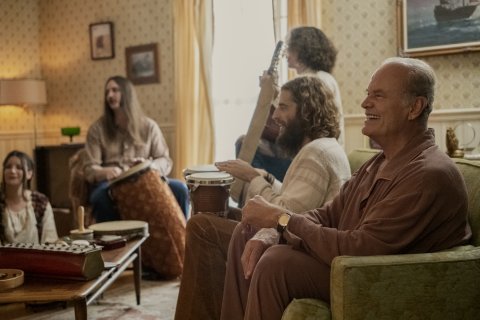
Beyond the Screen
In a sign that interest in Jesus goes beyond movies and television, purchases of religion-themed books are also on the rise, with unit sales of 20.1 million through the first six months of the year, up 23 percent over the same period in 2020, according to Circa BookScan.
Seeking to capitalize on the renewed popular interest, two Christian groups have set up a mass advertising campaign. Ads from Harvest featuring Laurie asking watchers to pray for Jesus to "come into my life, forgive me of my sin," have aired on Fox News and CNN.
A larger, $1 billion campaign dubbed "He Gets Us" promoting Jesus to unsuspecting watchers —unlike a film, viewers don't opt in to watch TV commercials—was not only a sign of the effort to mainstream Jesus in pop culture, but also how controversial such an effort can be. One of the several ads portrays adults mistreating one another and exclaims, "Jesus loved the people we hate."
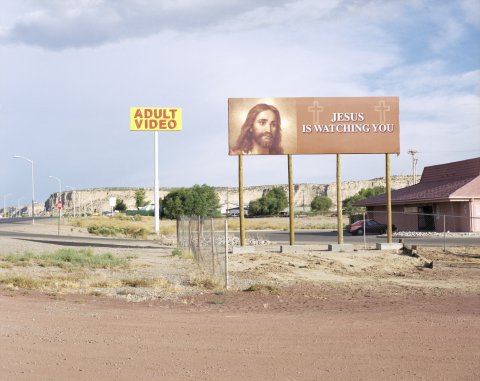
After two of the ads aired during the Super Bowl, New York Democratic Congresswoman Alexandria Ocasio-Cortez tweeted that, "Something tells me Jesus would *not* spend millions of dollars on Super Bowl ads to make fascism look benign." And on CNN, Chrissy Stroop of the left-leaning online magazine Religion Dispatches, said the campaign was "strategically developed by right-wing Evangelicals to rope people in with inclusive-sounding messaging."
There are also roughly 1,700 billboards across the nation courtesy of Christian Aid Ministries, an international relief organization founded by Amish, Mennonite and other conservative Anabaptist sects, with text like, "Discover why Jesus created you" and "Forgive like Jesus."
Jason Vanderground, the spokesman for He Gets Us, tells Newsweek that the campaign, funded by the conservative Christian founders of the Hobby Lobby store and thousands of anonymous donors, also purchased ad time during NBA and Major League Baseball games, and commercials will likely run during the 2024 Summer Olympic Games in Paris.
"Any time Christians are mentioned in the media, there's a propensity to say they're against women, immigrants and the LGBTQ community, none of which our campaign is about," says Vanderground.
A sign of the friction came with the recent controversy over an invitation by the L.A. Dodgers to The Sisters of Perpetual Indulgence; the drag performers dress as nuns and pole dance on a cross and were branded by one Catholic organization "as an anti-Catholic hate group" while liberals leapt to their defense. Caught between both camps, the Dodgers announced a "Christian Faith and Family Day" on July 30 to try to appease that constituency.
A Checkered Relationship
In Hollywood, the love affair with Jesus has been off as much as on over the decades. The blockbuster Ben-Hur starred Charlton Heston as a prince-turned-slave whose life is saved by Jesus. The 1959 film, subtitled, "A Tale of the Christ," set a record at the time for Oscars won and earned an inflation-adjusted $897 million, making it the 14th most popular film in history, according to Box Office Mojo. Jesus Christ Superstar made its Broadway debut in 1971 and stuck around for 711 performances. In 1977, Jesus of Nazareth starring Robert Powell—lovingly referred to by evangelicals at the time as "the blue-eyed Jesus"—aired over two nights on NBC and attracted 90 million viewers, half of all TV watchers.
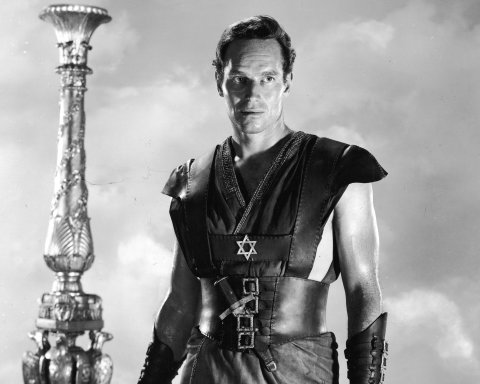
Mel Gibson's 2004 film about the crucifixion, The Passion of the Christ, was dubbed "the most controversial film of all time" by Entertainment Weekly while others condemned it as antisemitic. But the positive portrayal of Jesus became the most successful independent movie in history, racking up $611 million worldwide.
From 1934 until 1968 the so-called Hays Code of the National Legion of Decency prompted self-censorship by the film industry of anything that could appear immoral, but its influence swiftly waned.
Some critics believe a turn toward a harsher view of Christianity in film happened in the mid-1970s. They point to the film adaptation of the Stephen King novel Carrie, whose title character is born of a devout Christian mother and terrifies her town with murderous telekinetic powers. The critics argue that Christians are too often portrayed negatively on screen—with antagonists identified by their ownership of a cross or a rosary, or by their ability to cite passages from the Bible.
Dr. Barbara Harrington, head of the screenwriting program at Regent University, a private Christian university in Virginia that was founded by Pat Robertson, says Hollywood began focusing on making Christians the antagonists first because they stood against abortion, then, later, against gay marriage. "People in the industry see Christians as being on the wrong side of issues they care about," she says. "They think they're standing in the way of progress."
Some believe that theory explains why last year when some fans learned that Guardians of the Galaxy actor Chris Pratt—who speaks openly of his faith—attends a church associated with anti-LGBTQ stances, they took to the internet to presume he must be bigoted and homophobic. That caused fellow superhero actor Robert Downey Jr. to post on Instagram: "The 'sinless' are casting stones at my brother, Chris Pratt... A real Christian who lives by principle, has never demonstrated anything but positivity and gratitude."
"Hollywood loves its religious fanatics," says Tom Halleen, who had a 30-year career in TV and film before joining Biola University, a private evangelical Christian school in La Mirada, California, as its founding dean of the Snyder School of Cinema and Media Arts.
Halleen said artists typically infuse their values into their creations; it's the case with The Chosen and Jesus Revolution, and it's also true when Christians are the bad guys. "Many in Hollywood view Christians as self-righteous," he says. "And bad people leveraging Christianity to do bad things can be dramatic storytelling."
It comes at a cost, though. "Christians believe their faith is the core of who they are, and they don't want it denigrated," Halleen says. "The media doesn't understand them, so they don't trust the media."
There was also Scorsese's The Last Temptation of Christ in 1988—in which Jesus dreams of having sex with Mary Magdalene —though the Taxi Driver and Goodfellas director recently told Pope Francis he would be making a new film about Jesus, and possibly a more reverential one.

Hollywood's Christian critics cite a series of recent examples of what they see as bias. Actor Rainn Wilson, famous for his role as Dwight in TV's The Office, tweeted in March that "there is an anti-Christian bias in Hollywood," and he used an HBO post-apocalypse series as an example. "As soon as the David character in 'The Last of Us' started reading from the Bible I knew that he was going to be a horrific villain. Could there be a Bible-reading preacher on a show who is actually loving and kind?" the actor asked via Twitter.
"There are some in Hollywood going to great lengths to paint Christians in a negative light," says Lucas Miles, author of the recent book, Woke Jesus: The False Messiah Destroying Christianity.
In the first season of Slasher, a Netflix anthology thriller, a serial killer known as "The Executioner" is a Bible thumper whose victims have sinned, and multiple characters are portrayed as hypocritical or maniacal Christians.

"For the first time since early Rome," Miles tells Newsweek, "Christians are portrayed as the immoral agents in society. Christians eventually won over Rome, but now they're being accused of bigotry and hate speech because they hold to a Biblical worldview. There's a lot of money pouring into that narrative."
Christian Toto, author of Virtue Bombs: How Hollywood Got Woke and Lost Its Soul, says that one of the most egregious examples is the third film in the Purge franchise from Universal. In the film, God-fearing Christians cleanse their weapons in holy water before killing innocents while a notorious gang are portrayed as the good guys.
In late May, Baehr sent emails to his Movieguide supporters asking for support to stop Disney+ from streaming a show called Pauline, "a deeply disturbing satanic love story where a teenager is impregnated by the devil," as he described it. Disney had no comment on the boycott effort, other than noting that the show is not yet available in the U.S.
Kevin Sorbo, who stars in faith-based movies such as God's Not Dead, Let There Be Light and Left Behind, tells Newsweek that "Hollywood loves to tear down anything that has to do with love, laughter, faith, redemption and hope. And God forbid you show a family that has a mother and a father...anger, death, sex of any kind and violence is their god, small 'g.' Quite sad, really."
Those fighting for better depictions of Christians in the entertainment industry say they are aware that not all episodes of Christian history have been positive—pointing not least to episodes of sexual abuse by clergy—but they argue that modern Hollywood has tended to focus on the negative.
"There are real wounds that people have suffered at the hands of the church, and there's a lot of reinforcement of that in media," says Vanderground, the spokesman for the campaign behind the Super Bowl ads.
A Change in Direction
Nobody says that Hollywood's portrayals of Christianity have been universally negative. But the faithful do see that lately the entertainment industry's pendulum seems to be swinging in a more positive direction for them.
"Now there's a lot of movies doing P.R. for Jesus," says Miles, the author, who among other examples cites Pure Flix, a Christian streaming network that launched in 2015 as a family-friendly competitor to Netflix and acquired by Sony in 2020.

Michael Scott, Pure Flix's founder and CEO, tells Newsweek that the platform has more than 1 million subscribers—though that compares to over 230 million for Netflix. It creates about 30 shows and movies a year and licenses some 1,800 films and 800 TV shows, all of which are family friendly and designed to appeal specifically to Christians, such as the God's Not Dead franchise, The Chosen, The Case for Christ, War Room, Heaven Is For Real and The Passion of the Christ. It is in the process of merging with Great American Media, the home of Candace Cameron Bure, well known as D.J. Tanner, the oldest daughter in the TV series Full House, as well as for her Christmas movies.
"There's all sorts of negative notions about Christians in Hollywood, but there's no stronger argument to dispel those notions than success," says Sourian, who worked on the Fast and Furious movie franchise before joining The Chosen. "Everyone in Hollywood will become a Christian if there's money in it."
Not only is the Christian content out there more positive lately, there's also a lot more of it: Comsccore counts at least 28 faith-based movies that have been released since 2017.
"This is a moviegoing vertical to be reckoned with," says Paul Dergarabedian, a Comscore box office analyst. "It's an underserved market and they always seem to do better than expected. Studios need to justify making them, so they're low budget, and high profit."
By one metric, box office as a multiple of budget, Sherwood Pictures boasts some of the most successful movies in history. The filmmaking arm of Sherwood Baptist Church in Georgia, it made Facing the Giants in 2006 for just $100,000, and its box office haul was $10.6 million. Two years later, it produced Fireproof starring former teen idol Kirk Cameron for $500,000, and the movie took in 67 times that amount at the box office.
Around the release of Jesus Revolution, Downes co-hosted more than a dozen weekly prayer calls via Zoom for cast, crew, marketers and fans. One of them featured actor Alan Ritchson, who stars with Hilary Swank in the upcoming Lionsgate release, Ordinary Angels, a Kingdom Story Company film that tells the true story of a hairdresser who helps save a child's life.
Ritchson, best known for roles as Gloss in The Hunger Games: Catching Fire and the lead in the Amazon Prime series, Reacher, disclosed during one Zoom prayer event that he's in discussions with "one of the biggest studios" to help them launch a faith-based arm.
"People are hearing the name of 'Christ' in movie theaters...there's a movement afoot," he told the digitally assembled. "Other people in town watch this and a groundswell kind of takes place in Hollywood."
Baehr agrees, citing a conversation with an A-list producer he won't name: "He told me he makes two kinds of movies—Christian movies that make his wife and parents happy, and movies to make money and be a member of the club, which requires stooping."
"Jesus has always been in the public domain," adds Detweiler. "It's the intellectual property that God has shared with the world."
Al-Bustami, the actress who plays Ramah in The Chosen, agrees. Raised by a Catholic mom and Muslim dad, she never much thought about religion, until engaging in the inevitable deep discussions about Christ while on set.
Now, she says: "I like Jesus. He's a rad dude."
Update, 8/26/23 at 10 a.m. ET: The story was corrected to remove the name of an incorrect crowdfunding service.
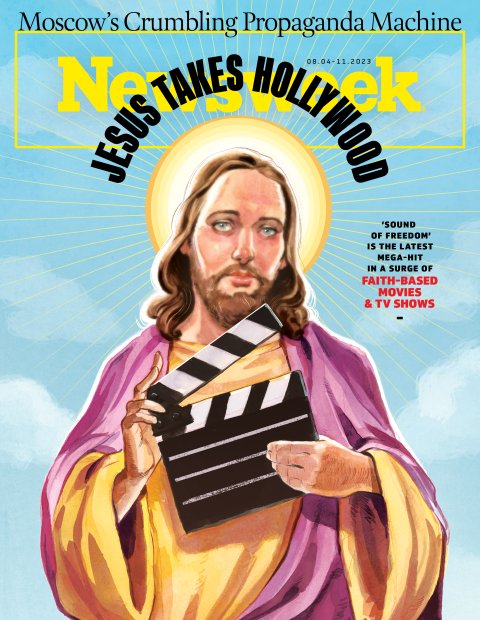
"freedom" - Google News
July 26, 2023 at 04:00PM
https://ift.tt/KcBV7iN
'Sound of Freedom' Reveals Rising Power of Jesus in Hollywood - Newsweek
"freedom" - Google News
https://ift.tt/jxpCVcq
https://ift.tt/FcH1YvO
Bagikan Berita Ini














0 Response to "'Sound of Freedom' Reveals Rising Power of Jesus in Hollywood - Newsweek"
Post a Comment